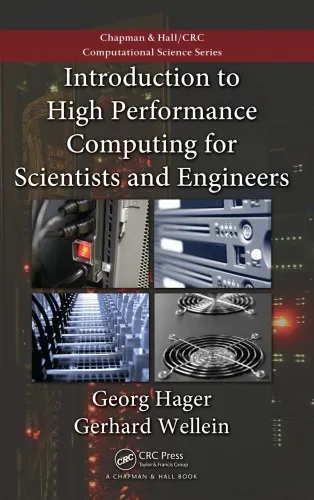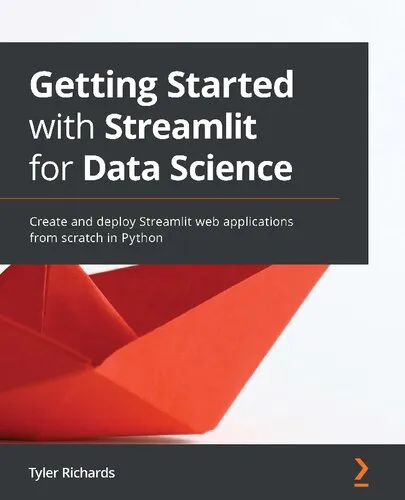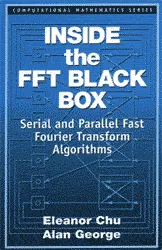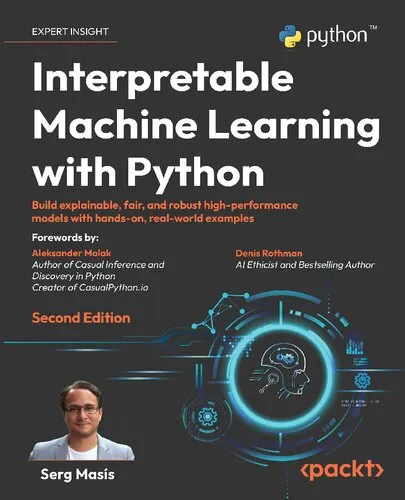Introduction to High Performance Computing for Scientists and Engineers (Chapman & Hall CRC Computational Science)
4.7
Reviews from our users

You Can Ask your questions from this book's AI after Login
Each download or ask from book AI costs 2 points. To earn more free points, please visit the Points Guide Page and complete some valuable actions.Related Refrences:
Introduction to High Performance Computing for Scientists and Engineers
Written by Georg Hager and Gerhard Wellein, Introduction to High Performance Computing for Scientists and Engineers serves as a comprehensive guide to understanding the principles, concepts, and practices behind high-performance computing (HPC). Designed for professionals, researchers, and scientists in technical fields, this book provides an in-depth exploration of solving computational problems more efficiently by leveraging modern hardware and software systems.
Detailed Summary of the Book
The book is structured to offer a progressive, hands-on approach to understanding HPC concepts. Starting with an overview of the fundamental principles, it covers the architecture of modern computing hardware and how to utilize these resources effectively in scientific codes. Focusing on both shared memory and distributed memory systems, the book explores programming models like OpenMP and MPI to help readers craft scalable algorithms and applications. Topics are explained with practical examples, making terms like cache hierarchies, vectorization, parallelization, and load balancing accessible for the computational novice and expert alike.
One of the book's defining features is its focus on bridging the gap between software development and hardware constraints. Whether addressing computational kernel optimization, memory access patterns, or performance bottlenecks, Introduction to HPC for Scientists and Engineers offers tips and strategies to overcome the challenges faced when transitioning from single-processor programs to massively parallel systems.
Real-world case studies and illustrations enrich the content, giving readers insight into applying techniques to their own computational problems. Additionally, the authors emphasize theory-backed performance modeling and data-driven analysis, ensuring that every computational effort translates to measurable efficiency.
Key Takeaways
- Gain a thorough understanding of modern hardware architectures and their impact on software performance.
- Learn essential programming concepts for shared and distributed memory systems, including OpenMP and MPI.
- Master performance modeling techniques to predict the behavior of computational workloads under different configurations.
- Optimize code for modern architectures by understanding memory hierarchies, caching strategies, and vectorization.
- Feel confident solving real-world scientific problems requiring extreme computational power by leveraging HPC tools.
Famous Quotes from the Book
"In high-performance computing, software performance directly depends on how well we utilize the underlying hardware structure."
"The challenge lies not in writing parallel code but in writing efficient, scalable, and sustainable parallel code."
"Understanding the interplay between hardware limitations and software designs is key to maximizing computational performance."
Why This Book Matters
As scientific research and engineering tasks increasingly rely on computational tools, professionals in these domains face growing complexity when tackling significant, resource-intensive problems. High-performance computing is no longer confined to niche applications—it plays a critical role in disciplines like climate modeling, physics simulations, artificial intelligence, and engineering design. However, achieving high performance demands a deep understanding of the interplay between hardware constraints and algorithmic principles.
This book provides an approachable yet rigorous foundation in HPC, equipping readers to improve computation on both established supercomputers and cutting-edge platforms. By fostering a mindset of optimization and performance modeling, it empowers scientists and engineers to solve large-scale problems more efficiently and make the most of advanced computational infrastructure.
In a world where computational demands will only increase, Introduction to High Performance Computing for Scientists and Engineers remains an essential resource for anyone looking to harness the true power of modern technology for scientific advancement.
Free Direct Download
You Can Download this book after Login
Accessing books through legal platforms and public libraries not only supports the rights of authors and publishers but also contributes to the sustainability of reading culture. Before downloading, please take a moment to consider these options.
Find this book on other platforms:
WorldCat helps you find books in libraries worldwide.
See ratings, reviews, and discussions on Goodreads.
Find and buy rare or used books on AbeBooks.
1432
بازدید4.7
امتیاز0
نظر98%
رضایتReviews:
4.7
Based on 0 users review
Questions & Answers
Ask questions about this book or help others by answering
No questions yet. Be the first to ask!





![The Ultimate iOS Interview Playbook: Conquer Swift, frameworks, design patterns, and app architecture [Team-IRA]](https://s3.refhub.ir/images/thumb/The_Ultimate_iOS_Interview_Playbook__Conquer__29925.webp)








